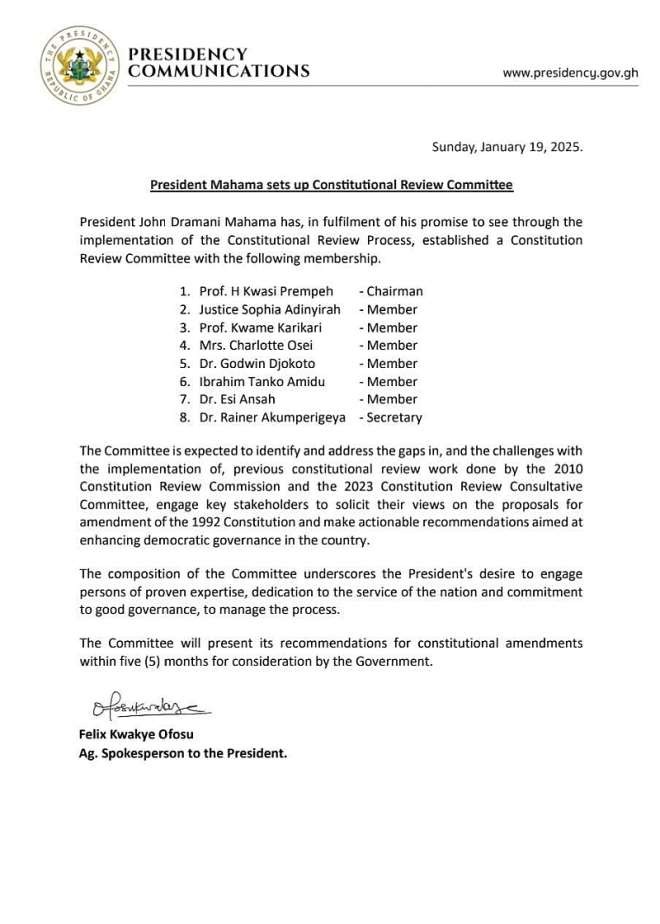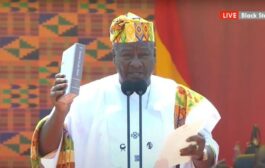Civil society and non-governmental organization Educate Africa Institute has made seven critical recommendations to the Constitutional Review Committee as part of efforts to make important amendments to the highest democratic authority.
This was contained in a press release intercepted by Bryt fm.
President John Mahama announced an 8-member committee to spearhead stakeholders engagements in possible changes that can be made to the 1992 constitution.
Here are the members of the committee:

Read below the full recommendations :
🚩PRESS RELEASE
Recommendations for Constitutional Review Committee – Gregory Diaw Addae, Educate Africa Institute (EAI)
Dear Members of the Constitutional Review Committee,
On behalf of the Educate Africa Institute (EAI), we write to offer recommendations for consideration during your constitutional review process. These recommendations address critical governance issues that, if implemented, will contribute to promoting transparency, accountability, and equity in our nation’s development.
1. Review Article 71 Appointees’ Allowances
The current provisions under Article 71 have allowed appointees to enjoy exorbitant allowances, which is unjustifiable given the state of Ghana’s development. These appointees must be compensated based on merit, productivity, and their tangible contributions to national progress, rather than enjoying benefits that do not reflect their output. It is critical to institute fair and sustainable remuneration frameworks that serve the national interest.
2. Abolishment of Ex Gratia Payments
President John Dramani Mahama publicly expressed his intention to abolish the ex-gratia system. We strongly urge the committee to work on this promise by enshrining its cancellation into the constitution. This will ensure equity in the distribution of national resources and curb the overburdening of the national budget.
3. Addressing Corruption by Past Presidents and Public Officials
The constitution must include provisions to immediately address corruption or oversight of corrupt activities by any sitting or past president. The current practice of waiting for over a decade before addressing such issues only fosters impunity. Swift and decisive action will set a strong precedent for accountability in leadership.
4. Prohibition of Family and Friends Governance
The constitution must include explicit clauses to prevent nepotism and favoritism in governance. The appointment of family members and close associates to positions of influence often undermines fairness, fosters corruption, and erodes public trust. Governance must be based on meritocracy and professionalism, not personal relationships.
5. Review of Impunity by Government Appointees
The committee must review and limit the unnecessary impunity exercised by government appointees. Public officeholders must be held accountable for their actions and decisions.
6. Protection of Persons with Disabilities
The constitution must guarantee comprehensive protections for persons with disabilities, ensuring they feel valued and have equal access to social support systems without any form of discrimination. Additionally, individuals who disrespect or discriminate against persons with disabilities must face severe punishment.
7. Regulation and Taxation of Churches
The constitution must address the growing number of churches and ensure they are properly regulated. These churches, which engage in commercial activities such as selling anointing oil and miracle water, should be required to pay taxes to support national development.
These recommendations reflect the sentiments and aspirations of many Ghanaians who desire a constitution that fosters good governance, accountability, and inclusivity. We trust the committee will give due consideration to these proposals in shaping a better future for our nation.
…Signed…
Gregory Diaw Addae
Administrative Director, EAI
+233542768660
EAI: Education and Social Justice
Source:Mybrytfmonline.com/EAI




















































